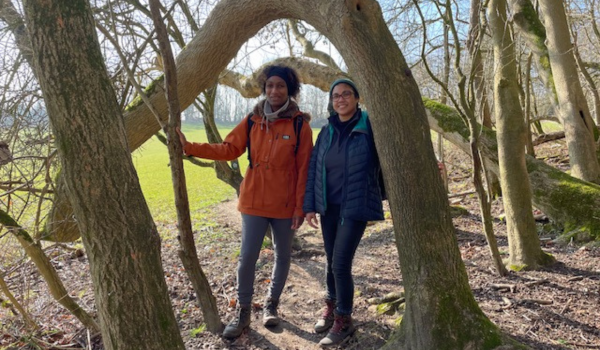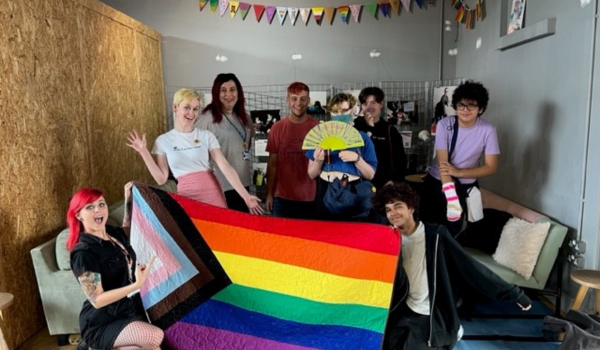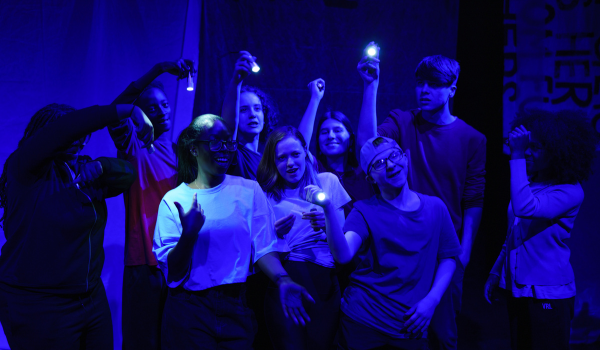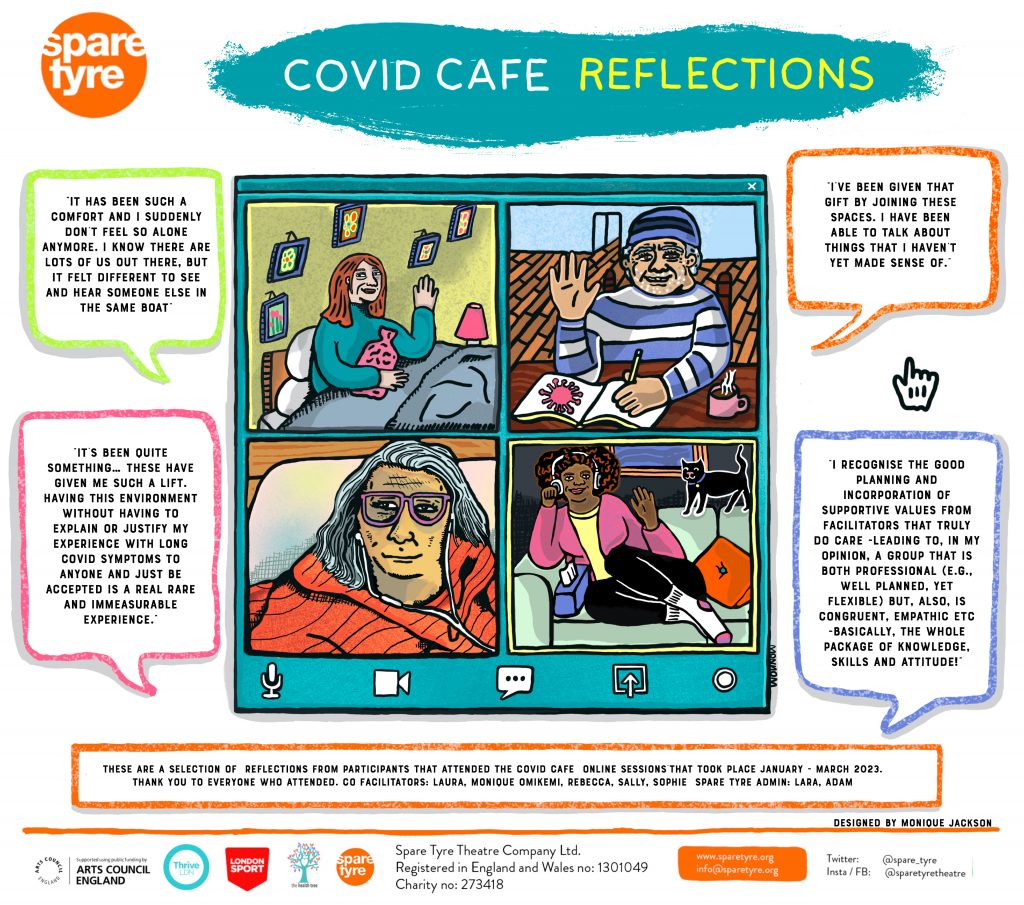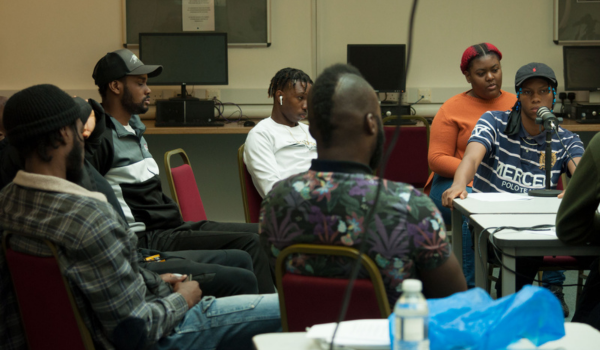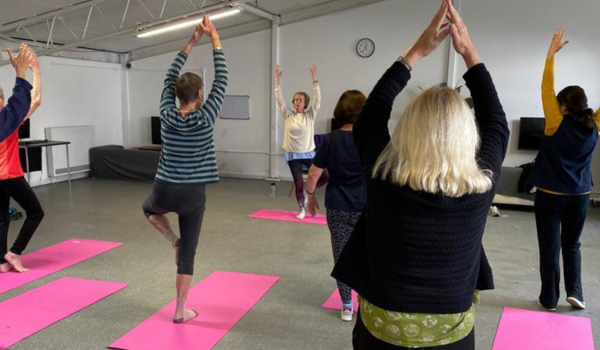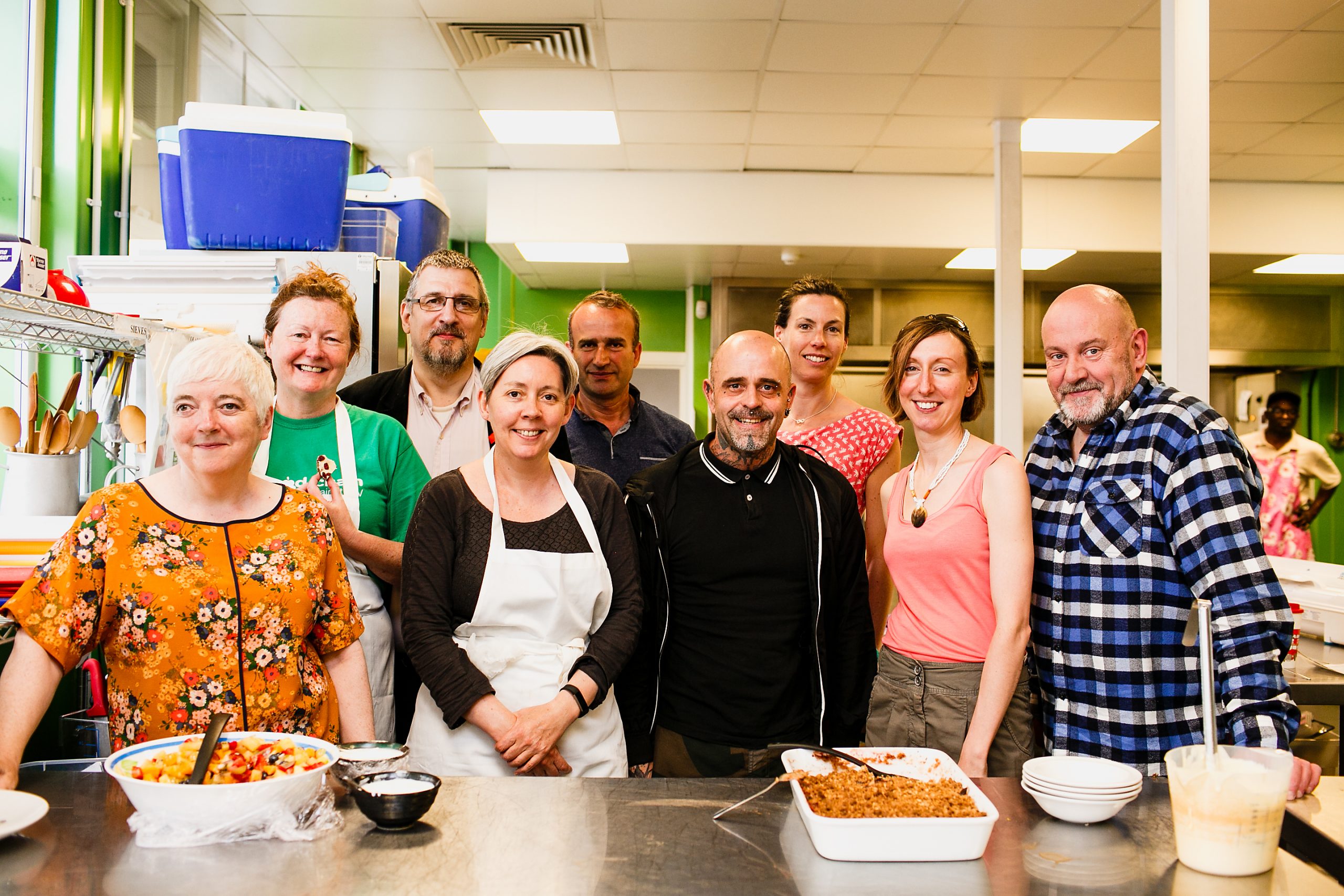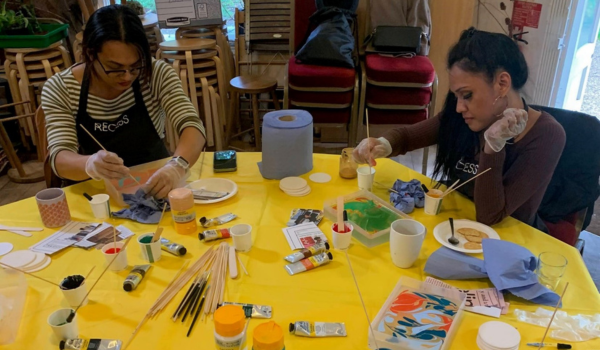
Right To Thrive Impact Report (2023)
The Right To Thrive initiatives report provides a snapshot illustration of our approach to embedding equity, disrupting accepted approaches to public mental health, and celebrating the innovation and resilience of London’s communities.
The Right To Thrive initiatives report provides a snapshot illustration of our approach to embedding equity, disrupting accepted approaches to public mental health, and celebrating the innovation and resilience of London’s communities.
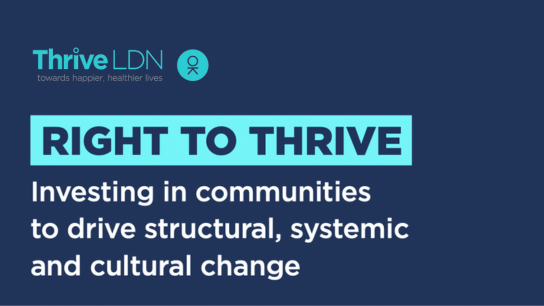
Report
Updated: 23/05/2023
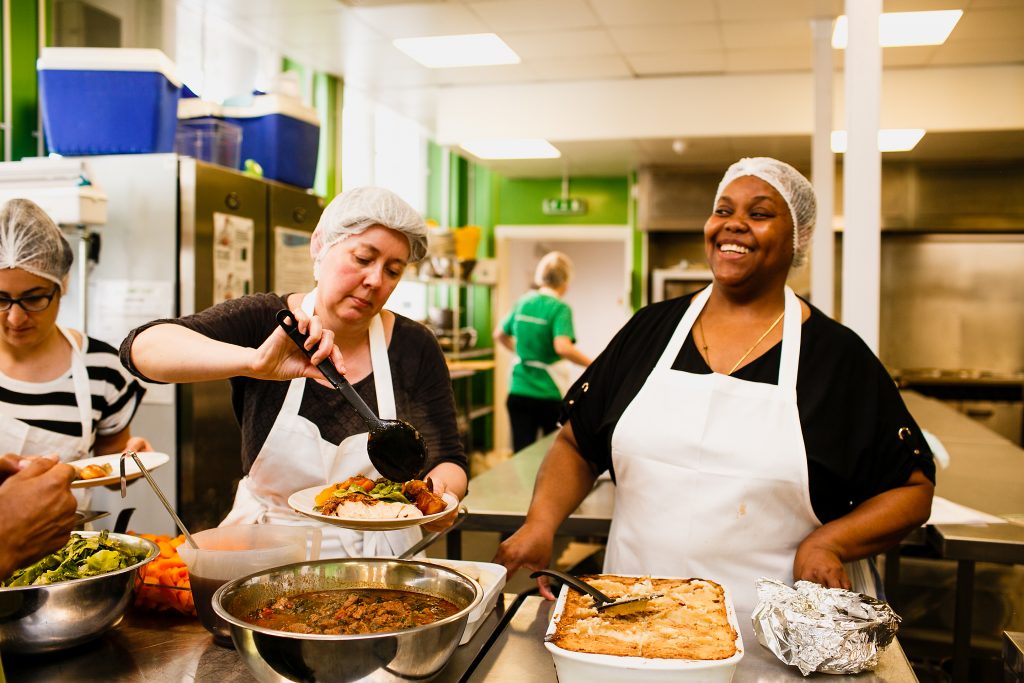
Investing in communities to drive structural, systemic and cultural change
In this report we present a high-level overview of the outcomes and impact of Right to Thrive through a timeline of activities, setting the context and case for targeted intervention, and by presenting 12 spotlights into the work of grassroot and community organisations.
Here, we begin to share and explore the emerging themes from London’s Right to Thrive partnerships and projects. We also draw upon wider examples of positive community intervention and targeted support.
PDF download
Introduction
In this report we present a high-level overview of the outcomes and impact of Right to Thrive through a timeline of activities, setting the context and case for targeted intervention, and by presenting 12 spotlights into the work of grassroot and community organisations.
Therefore, this report is not a comprehensive reflection of all Right to Thrive related activity, but instead provides a snapshot illustration of the approach to embedding equity, disrupting accepted approaches to public mental health, and celebrating the innovation and resilience of London’s communities.
Here, we begin to share and explore the emerging themes from London’s Right to Thrive partnerships and projects. We also draw upon wider examples of positive community intervention and targeted support.
The stories, narratives and lived experiences of the 1,000s of people Right to Thrive has reached speak for themselves. We hope this report also shines a light on community leaders from across London, all of whom have played a significant role in supporting some of the most marginalised and disadvantaged people in recent years. This can be seen through the 43 grassroots projects London’s Right to Thrive initiative has directly supported but also beyond in the partnerships and collaboration which has emerged since the initiative began.
In the report’s foreword, Michael Hamilton from The Ubele Initiative outlines important next steps for the Right to Thrive initiative through the development of a community of practice. In short, a space to share knowledge, network, and discuss ideas and the issues and challenges relevant to participants’ experience of community and grassroots working. At the same time, this supports decisionmakers to continue learning and listening from Right to Thrive participants, as well as supporting to amplify voices, develop leadership, and redistribute power.
Yet, this work is not meant to be definitive. We emphasise throughout this report the need to understand more about the intersectional nature of issues communities face, the impact of cumulative stressors over time and the systemic action needed to address them. Thrive LDN is committed to further diversifying and democratising our processes and activities by working with communities to iterate, listen and develop ways of supporting Londoners.
Our thanks to all those who have supported Right to Thrive’s journey to date and worked with us and those the initiative has supported. We look forward to building on the work described in this report and working towards creating a healthier, fairer city, where nobody’s mental health and wellbeing suffers because of who they are or where they live.
Foreword
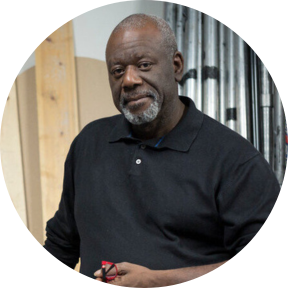
By Michael Hamilton (The Ubele Initiative)
We know that individuals and communities with multiple backgrounds, particularly marginalised and racialised groups, are more likely to experience unfair treatment which negatively impacts their mental health and wellbeing.
Thrive LDN and the Mayor of London’s Right to Thrive initiative has been a positive step to offer targeted support for Londoners who are experiencing exclusion, discrimination and bias because of their intersectional identity.
Last year, Thrive LDN commissioned The Ubele Initiative to facilitate a community of practice with Right to Thrive grant participants. Being community-rooted and collaborative in character, this has naturally been something that we have been pleased to support and establish. It also aligns strongly to Ubele and our own work and values.
A community of practice is made up of groups of people who share a concern, a set of problems or a passion about a topic, and who deepen their knowledge and expertise in this area by interacting on an ongoing basis.
The community hopes to amplify voices, develop leadership, and redistribute power. The community of practice is a space to share knowledge, network, discuss ideas, and the issues and challenges relevant to participants’ experience of community and grassroots working.
Importantly, it feels like this comes to fruition at an important time and juncture. Both within the development of the Right to Thrive initiative but also when considering how the challenges from the economic crisis and wider threats continue to be felt by so many of London’s diverse communities. And the realities of how this is being felt unevenly across the city are as clear as ever.
Yet, we must remember, from current cost-of-living pressures to our recovery from the pandemic, it has been our communities, friends and families which have played the most important role in getting us through difficult times together.
Establishing this space demonstrates a long-term commitment to continue supporting the Right to Thrive community and grassroots projects. Three sessions have so far taken place, both virtual and in-person. These sessions served to open the discussion on what a community of practice looks like for this group, what areas the group want to prioritise, and how they wanted to operate going forward. The group also have an online platform where the community can interact. Future sessions will be based on knowledge sharing, with external speakers covering topics relevant to the group’s development.
The community is working in an iterative way and learning through the process. It’s an exciting development – if you’d like to learn more or get involved, please contact the Thrive LDN team.
About Right To Thrive
Right to Thrive is Thrive LDN’s ongoing commitment to celebrate and protect diversity in London, especially for those at higher risk of unfair treatment based on their identity, beliefs, or social class, and in some cases a combination of these.
Established in 2018, the programme has evolved and grown over time becoming a coalition of shared experiences of marginalisation and discrimination. From the outset Thrive LDN and partners were clear that diversity was not just an added extra, but one of the most valuable assets of our city. However, this position has been strengthened and reinforced to ensure that Right to Thrive is both a programme and a value system where diversity is seen as the bare minimum, where inclusion is the standard practice, and where equity is at the centre of all action.
Five years on, Right to Thrive remains an ongoing commitment from Thrive LDN to move away from rhetoric on reducing inequality and focus on systemic inequity and produce evidence of how and why intersectional and community-led approaches work. We continue to celebrate London as a global city where people from different countries, cultures and classes live together, side-by-side. At the same time, we are also building together a critical mass to name and dismantle the problems London face – racism, homophobia, transphobia, ableism, sexism and other factors which reinform systemic social and health inequities.
Since 2018, Right to Thrive has invested more than £450,000 in grassroot and community led organisations engaging directly with Londoners at disproportionate risk for poor mental health and wellbeing.
The outcomes and impact associated with these projects demonstrate the value of community-based and culturally adapted interventions. Importantly, showing how a one size fits all approach cannot work for protecting and promoting the mental health and wellbeing of London’s diverse population.
Going forward, we are ambitious about expanding Right to Thrive, to reach more Londoners who experience discrimination, inequality and inequity. We want to embed the values of Right to Thrive across the health and social care system to drive structural, systemic and cultural change.
We acknowledge that the level of change required will take time, with a significant amount of work required to build relationships and earn trust from excluded groups. Not least because the overall accountability goes much wider than the remit of Thrive LDN and partners. However, we will do this by ensuring further transparency of processes, monitoring and accountability with all stakeholders and continue to develop mutually beneficial relationships across everything we do.
Theory of Change
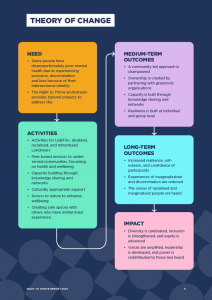
NEED
• Some people have disproportionately poor mental health due to experiencing exclusion, discrimination and bias because of their intersectional identity
• The Right to Thrive workstream provides tailored projects to address this
↓
ACTIVITIES
• Activities for LGBTQ+, disabled, racialised, and minoritized Londoners
• Peer-based services to underserved communities, focussing on health and wellbeing
• Capacity building through knowledge sharing and networks
• Culturally appropriate support
• Access to nature to enhance wellbeing
• Creating safe spaces with others who have similar lived experience
↓
MEDIUM-TERM OUTCOMES
• A community led approach is championed
• Ownership is created by partnering with grassroots organisations
• Capacity is built through knowledge sharing and networks
• Resilience is built at individual and group level.
↓
LONG-TERM OUTCOMES
• Increased resilience, selfesteem, and confidence of participants
• Experiences of marginalisation and discrimination are reduced
• The voices of racialised and marginalised people are heard
↓
IMPACT
• Diversity is celebrated, inclusion is strengthened, and equity is advanced
• Voices are amplified, leadership is developed, and power is redistributed to those less heard
Right To Thrive timeline
Right click to open image in new window
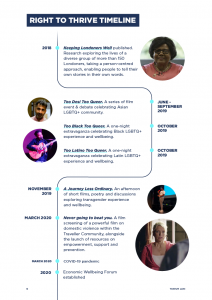
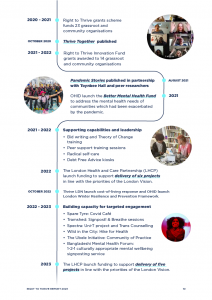
2018
Keeping Londoners Well published. Research exploring the lives of a diverse group of more than 150 Londoners, taking a person-centred approach, enabling people to tell their own stories in their own words.
JUNE – SEPTEMBER 2019
Too Desi Too Queer. A series of film event & debate celebrating Asian LGBTQ+ community.
OCTOBER 2019
Too Black Too Queer. A one-night extravaganza celebrating Black LGBTQ+ experience and wellbeing.
Too Latino Too Queer. A one-night extravaganza celebrating Latin LGBTQ+ experience and wellbeing.
NOVEMBER 2019
A Journey Less Ordinary. An afternoon of short films, poetry and discussions exploring transgender experience and wellbeing.
MARCH 2020
Never going to beat you. A film screening of a powerful film on domestic violence within the Traveller Community, alongside the launch of resources on empowerment, support and prevention.
MARCH 2020 – COVID-19 pandemic.
Economic Wellbeing Forum established
2020 – 2021
Right to Thrive grants scheme funds 23 grassroot and community organisations.
OCTOBER 2020 – Thrive Together published
2021 – 2022
Right to Thrive Innovation Fund grants awarded to 14 grassroot and community organisations
AUGUST 2021 – Pandemic Stories published in partnership with Toynbee Hall and peer researchers
2021
OHID launch the Better Mental Health Fund to address the mental health needs communities which had been exacerbated by the pandemic.
Supporting capabilities and leadership
- Bid writing and Theory of Change training
- Peer support training sessions
- Radical self-care
- Debt Free Advice kiosks
2022
The London Health and Care Partnership (LHCP) launch funding to support delivery of six projects in line with the priorities of the London Vision.
OCTOBER 2022 – Thrive LDN launch cost-of-living response and OHID launch London Winter Resilience and Prevention Framework.
2022 – 2023
Building capacity for targeted engagement
- Spare Tyre: Covid Café
- Tramshed: Signpost! & Breathe sessions
- Spectra: Uni-T project and Trans Counselling
- Wild in the City: Hike for Health
- The Ubele Initiative: Community of Practice
- Bangladeshi Mental Health Forum: 1-2-1 culturally appropriate mental wellbeing signposting service
2023
The LHCP launch funding to support delivery of five projects in line with the priorities of the London Vision.
Beyond Equality
Beyond Equality: Embracing the Vitality of Equity
Every Londoner should have an equal right to mental health. The sad truth is they don’t.
Social inequalities impact people’s mental health and wellbeing, with significant implications for their life outcomes. Evidence and insights gathered from Londoners through Right to Thrive projects have shown that huge variation exist in terms of both experiences and outcomes, depending on who you are and where you live.
Whilst equality ensures fair treatment and access to the same opportunities, equity recognises that not everyone starts from the same position. Thus, fair treatment – although important – alone does not address disparities between social groups.
Equity goes beyond equality by supporting us to gain insight towards the processes that contribute to unfair outcomes by observing and measuring the disparities between social groups through the comparison of social advantages and disadvantages.
It is worth remembering that people don’t fit neatly into one label – they are not just disabled, or just Black, or just older, or just LGBTQ+. Any combination and intersection of factors will amplify the negative or positive experiences that individuals face.
Contextualising social inequalities helps to minimise assumptions by providing detail towards the circumstances in which a particular event or situation takes place. Right to Thrive partnerships and projects have helped us to better understand this and learn lessons during the most challenging years of many Londoners’ lives.
Supporting All Londoners To Live Happier And Healthier Lives
Events in recent years have exposed the inequalities which exist in our society, shining a harsh light on longstanding structural injustices.
For many communities across London, the coronavirus pandemic was the latest crisis event in a crisis trend – a steadily worsening series of situations disadvantaged communities across London face.
Then as London’s recovery from the pandemic was underway, the economic shock felt through the increase in cost-of-living pressures has affected many of the same communities who were hit hardest by the pandemic.
There is no doubt that racialised communities particularly and others from lower socio-economic positions are suffering the impacts of the pandemic and economic crisis more than others.
Additionally, we can’t overlook other scenarios and issues, such as the climate emergency and recent geopolitical crises on an international scale. All these events place pressure on Londoners and create wider inequalities, disproportionately affecting Londoners with lived experiences of marginalisation and disadvantage.
Learning From Right To Thrive Participants
It is significant that we engage with and listen to communities with lived experiences of inequality and discrimination. The pandemic and cost-of-living crisis have also forced the opening up of new forms of relationships, action and alternatives.
We have seen greater cross-sector partnerships established to support all Londoners to have happier and healthier lives. We need to harness this momentum. Grassroots organisations play an important role in supporting local communities to thrive.
We need to ensure continued support for grassroots and community organisations and those who they support lead on and are included in decisions which affect their mental health and wellbeing.
The need to understand more about the intersectional nature of issues communities face, the impact of cumulative stressors over time and the systemic action needed to address them is even more evident. Doing so will also support the wider London community to be more aware of social injustices through a lens of intersectionality
An Emerging Theme Of Hope
Many communities who have been disproportionately affected identified the significance of family and support structures, and the support offered by wider community and faith groups.
This strengthens what we already know: that there is a clear relationship between resilience and coping with uncertainty, and the power of relationships, collectivising, and social networks. Nobody’s mental health and wellbeing should suffer because of who they are or where they live. Thrive LDN has long emphasised the need to broaden opportunities and promote acceptance and inclusion.
We must collectively work together to overcome stigma and ensure that people from a wide range of backgrounds and communities have more support available for them.
Diversity is one of London’s most valuable assets. London is home to more than a million European Union citizens and 63.2% of all Londoners identify as an ethnic group other than “White: English, Welsh, Scottish, Northern Irish or British” (2021 Census). Our city also has vibrant lesbian, gay, bisexual, transgender and queer communities. We live and work in a global city where people from different countries, cultures and classes live together, side-by-side.
Right to Thrive has been an ongoing commitment to develop and support social action and community activism in our cities, which in London is often a beacon of hope during tough times.
But it is not enough to simply call out injustice when we see it. We must mobilise, being led by communities and using our power to influence change and the breakdown of systemic inequity.
Demonstrating Impact 2019-2023
Here, we begin to share and explore the emerging themes from London’s Right to Thrive partnerships and projects.
Wild In The City - Hike For Health
WILD IN THE CITY (WITC) supports wellbeing through relationship with nature in London and beyond. They work from natural settings offering experiences in hiking, woodland living skills, natural history and ecotherapy.
The Hike for Health project supported the resilience of people from racialised and minoritised backgrounds to address the impact of stressful life challenges by offering a programme of regular hikes. Evidence shows that time in nature reduces stress, depression and anxiety and increases good mood and a sense of belonging.
The project engaged more than 80 Londoners from racialised backgrounds, creating opportunities to experience the benefits of nature in a safe and welcoming group.
Participants reported a greater sense of well-being, expressed a keen interest to participate in future walks, and expressed appreciation for the community that has grown as a result of the hikes.
Positive relationships have been built between nature guides and participants, with participants offering support and encouragement to each other and strong camaraderie between participants.
Bangladeshi Mental Health Forum
THE BANGLADESHI MENTAL HEALTH FORUM (BMHF) is a grassroots mental health charity based in Tower Hamlets. The Forum exists to challenge cultural stigma, stereotypes, and prejudicial views attached to mental health in the local Bangladeshi community, as well as advocating for and raising awareness of mental health in the community.
BMHF’s mental wellbeing signposting service was established during the pandemic and has been re-instated, providing a localised, culturally and language appropriate service.
Individuals and families in the local community have been engaged through community based outreach and a 1-2-1 service, where individuals are able to book a session or just call to discuss their needs and be signposted to a local service.
The sessions have enabled trusting relationships, provided reassurance when needed, and offered connection and follow-up support, ensuring members of the local community felt listened to and understood, as well as providing clear action and guidance to support.
The shame and stigma associated with mental health has resulted in a lot of people suffering in silence and an under-representation of the community accessing mainstream mental health services. BMHF is actively challenging the perception of mental health as a taboo subject within the local Bangladeshi community.
“The funding has given us the opportunity to expand our service to the wider community and in different settings, which has benefited a lot more people and will continue to do so in the future. We are more proud of how we have been able to provide support to people close to where they live and in their community language.”
Spectra
SPECTRA’s mission is to improve health and wellbeing in diverse, marginalised and underserved communities, with a strong focus on LGBTQ+ communities. Their peer-led and delivered approach enables and empowers individuals to make positive, informed choices about their health and wellbeing. Spectra provides supportive, knowledgeable, nonjudgemental support to those who need it most.
Right to Thrive funding helped ease the burden on Spectra’s exceptionally high demand for therapeutic services, which received 400+ referrals to trans counselling alone in under six months.
The peer-led support to LGTBQ+ young people and trans counselling service has provided an open, inclusive, affirmative and trans-positive space to those who would otherwise be on a waiting list or never followed up. The trans counselling services were able to create additional capacity to deliver counselling to an extra 6 clients, with a total of 72 additional client sessions.
Themes and issues addressed include self-esteem, suicidal ideation, and selfharm; experiences of transphobia and discrimination, gender dysphoria. There is compelling evidence of the impact of the trans counselling service, with an external evaluation showing an overall improved mental health status among service users and clients were emotionally stronger and more resilient because of counselling received. Funding also enabled continuity of service for Pyramid LGBTQ+ youth groups.
Engagement with Pyramid allowed all 14 group members a safe space to be themselves and gives them space to question and discover their identities, without worry.
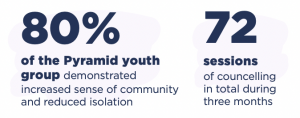
Tramshed
TRAMSHED ARTS LTD plays a significant role delivering wellbeing through creativity for Greenwich residents, in the heart of Woolwich. They have been a locally rooted organisation providing activities since 1971. The Signpost project has used Tramshed’s experience to equip participants to recognise and celebrate steps towards increased resilience, selfesteem and confidence.
Right to Thrive supported Tramshed’s Young Company for emerging creatives aged 18 and under to upskill, rehearse, perform and gain experience in the arts. The intensive period allowed for cohesion, and the group dynamic was full of good energy.
Breathe is a wellbeing-focussed adult support group for parents, carers and guardians. A creative practitioner and a crèche worker were employed through Right to Thrive funding so that adults and children were cared for during the sessions.
Breathe was co-produced with parents and carers, with sessions including poetry writing, art, stress management, singing and sonic healing.
“Coming here has made me feel more confident. It is good to meet other parents and not feel that I am on my own all of the time. I’ve found out about other places I can go with my child too.”
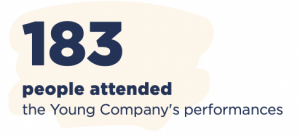
The Ways of Wellbeing
(Written by Breathe Group at Tramshed)
Smile, then
The day will take care of itself
Make time for those you care about
Walk for peace of mind
Walk faster for fitness
Move for joy
Learn to swim
Appreciate the beauty around you
Remark on the unusual, curiously
Focus on creating something
Enjoy your resolutions
Inspired by love
Invest in yourself and your passions
To improve your self-esteem
Give a compliment every day
Give your peace of mind to others
Smile
Spare Tyre
SPARE TYRE is intersectional by nature, anti-racist, inclusive, experimental and planet-loving by choice. As a leading participatory theatre company, Spare Tyre seeks to reflect society, challenge its prejudices and make life equal.
The COVID Café was launched in response to the pandemic which was highlighting how many people are living with invisible disabilities and conditions. The café offered a creative, gentle, and inclusive online space for anyone living with Long Covid (and other long term health conditions).
Right to Thrive funding enabled a pilot of a new strand of the café and trained two new facilitators which was developed by Spare Tyre’s Artistic Director (who has lived experience with Long Covid) with an awareness of the problem of isolation experienced by those in Long Covid and shielding communities.
The Connected Series pilot, along with COVID Café drop-ins, created a new community of people at different stages of their health journey and shared experience of isolation.
“Spare Tyre described the perfect café as a place for those with Long COVID to hang out with other people who ‘get it’, share discoveries, and to explore new ways of being in the world. No therapies, no pressure, no judgement. A little breathing, a chance to reset, a gentle workout for your imagination and your creativity.”
“I’ve been given that gift by joining these spaces. I have been able to talk about things I haven’t yet made sense of.”
“It has been such a comfort and I suddenly don’t feel so alone anymore. I know there are lots of us out there, but it felt different to see and hear someone else in the same boat.”
Sing For Freedom
THE SING FOR FREEDOM CHOIR unites displaced people with others from across London and around the country who join to sing in solidarity with them.
Founded by survivors from the charity Freedom From Torture, it offers members a joyful community of friendship founded in music, and delights audiences with unique and life-enhancing performances.
The choir has performed at Milton Court in the Barbican, at the Southbank Chorus festival, at the Tilbury Carnival, the GLA Scoop and Union Chapel, amongst others. The choir brings together refugee and asylum seekers who experience many challenges including isolation, financial hardship, exclusion and depression or stress.
Many of whom are survivors of torture and suffering numerous mental health challenges as a result. A Right to Thrive grant supported the choir during the height of the pandemic, at a time when many involved with the choir faced a greater level of uncertainty, stress, anxiety due to the disproportionate and adverse implications of the pandemic.
The choir was supported to continue the weekly rehearsals which provided an opportunity of around 40 participants the chance to relax, focus on breathing and being in the moment, connect with others through music and importantly have some fun. Participating in the Sing for Freedom Choir offered a community of friendship which has kept people going since, for many it was a lifeline of contact during very difficult times. Participants who were unable to join weekly rehearsals, whether due to work or studying commitments, were kept in touch and included in WhatsApp groups, this allowed many to still be able to participate in the music videos and concerts.
Through the choir, people shared messages of hope, solidarity and personal encouragement. Partnerships were strengthened and developed during this time with some outreach workshops developed through connections made with the Red Cross in Hackney and Chelsea. Both have subsequently referred new members to the service.
Additionally, the choir was able to extend links with Freedom From Torture who premiered the choir’s I Choose Love video at their Resilience Festival in November 2020.
“Torture is not something you ever escape completely, loneliness and isolation give you time to think but the singing touches my soul, [helps me] express myself, resonates with my heart, mind, and spirits as times. Singing helps me to forget my troubles, lifts me to another dimension and give me happy mood. Personally, it makes me feel part of a greater whole and improves mental wellbeing. It is non-discriminatory.”
“The Choir inspired me by being my voice because I’m a Torture Survivor, which I’ve not been able to talk [about] before. Torture made me silent, but the choir gave me a voice.”
“Enabling people to participate in activities they may not have been able to previously makes a positive impact on communities and everyone involved in the choirs. It spreads love.”
Storm Family Centre
Marie Hanson MBE is the CEO and founder of STORM FAMILY CENTRE in Battersea. As a survivor of domestic violence, Marie founded STORM to help people in need of support. The acronym stands for Support, Trust, Opportunity, Rebuilding and Motivation. STORM offers a range of services for families including free counselling, therapy, a nursery, and a befriending group.
“The resilience of the young people has been outstanding.” – Marie Hanson, founder of STORM Family Centre
STORM also provides a platform for young people to showcase their ideas and prepare them for their futures. At the centre, they have the opportunity to take part in workshops, training, music, creative arts, cookery and so much more. Empowering people to reach their full potential is at the heart of everything they do.
Using a Right to Thrive grant, STORM facilitated a series of podcast production and recording workshops with a group of 15 young Black male adults from the local community. The project took place during the height of the pandemic, so the sessions were delivered between a mix of in-person and virtual sessions depending on the safety measures in place at the time.
Conducting these engagement sessions with young people during the pandemic was timely in supporting them with their own wellbeing and the challenges around them. Topics included health and covid, but also other topics of interest, including knife crime, music, film and creative industries and community response to the pandemic.
The workshops offered a chance for young men in the community to open up, share their thoughts and concerns, and connect together. “The resilience of the young people has been outstanding,” says Marie. “Due to our current ambassadors and board members, we were able to interview celebrity actor Will Poulter.
We had not planned on interviewing any celebrities, but we were able to make the connection and our young people were excited to meet him and interview him. We have gained new members, new ideas for future projects and we look forward to engaging more young people on this project from other communities.”
You VS You
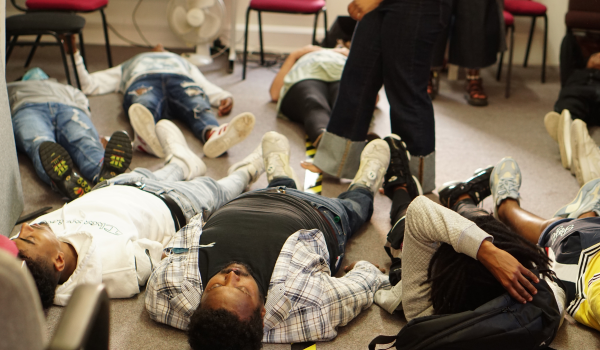
YOU VS YOU works with young people from diverse backgrounds carrying out one-to-one mentoring, mental health workshops, and personal and interpersonal development. A Thrive LDN Right to Thrive grant enabled the organisation to teach mindfulness techniques to help participants build their resilience and look after their wellbeing.
Founder and CEO Ahmed Mohammed said: “COVID-19 actually impacted on the community that we work with because we work with young refugees and asylum seekers in Haringey. Understand that in the majority of these young people, English is not their first language. Sometimes they struggle with the government guidelines as well and also some of them are actually anxious around their refugee status or their leave to remain status. They are always anxious about it because they don’t know what’s in store in terms of their future.” Participants take part in three mindfulness sessions and an inspirational workshop. As Ahmed explains, the idea is “to show them that there are things that they can do to help them to either be of a positive mindset or even be able to make that phone call to seek professional help.”
Ahmed was inspired to start You vs You by his own personal journey: “I came to the country as an unaccompanied asylum seeker at the age of 14. I’ve been through the care system, the asylum process. I was very fortunate to have good people and good social workers around me that helped me to get to where I am today.
Society would have projected someone like myself to either be in jail or doing drugs or not be on the positive side of life, but fortunately I’m here today, giving back to my community and supporting young people.” Ahmed believes that helping young people will help the community to thrive, and create a better society: “The majority of our young people, there are so many anxieties around them, but if they are to thrive, just like with the help that was given to me growing up for me to be able to be where I am today, it’s the reason I’m doing what I’m doing to help other young people which means they will be able to pursue their dreams, go through education and become a better citizen which will improve our society.”
Zen W5
QUEEN’S CRESCENT COMMUNITY ASSOCIATION (QCCA) is a major provider of free and subsidised services for people in the Gospel Oak area. It provides youth services, older people services and support projects to improve family health.
Many of its staff grew up in the neighbourhood, one of the most socially deprived in the UK. It acts as hub which regularly brings together residents, councillors, police, MPs and other local charities. But most of all, it is a place that believes in inclusion, cooperation, and tolerance. As soon as the first lockdown began QCCA swung into action, setting up a food bank and a telephone befriending service. “We had over a hundred and twenty volunteers,” says QCCA’s Elaine Mulligan.
“They were coming in droves to support, to deliver food to elderly, vulnerable and isolated individuals and to me that is the sign of a community that’s thriving and wants to thrive and wants to continue with this, wants to develop further.
“Looking at Gospel Oak, and how as a community we responded to COVID-19 and this awful pandemic, that can be seen quite plainly in the response from the local community. They just picked up and ran with it, they responded in a way that puts my faith back in humanity.” QCCA used a Right to Thrive grant to support the Zen W5 project as part of its healthy families work, supporting weekly women’s only yoga, weekly women’s only Zumba and five family fun days on Hampstead Heath during the summer holidays.
The project had a particular focus on displaced people in the community and the funding meant that QCCA was able to recruit both an Arabicspeaking programme assistant and an Arabic-speaking volunteer to deepen engagement with participants.
Elaine explains: “We are empowering local community members, especially those of a minority ethnic background, those who are refugees, asylum seekers and females. We’re looking to support females, families, and those families with young children.
The whole idea being that we improve their fitness, their mental health, their access to services.
We’re supporting them in any way they need, whether it be peer support, health advice.
Primarily, we are there to look after the whole family as a unit.” Overall, the funding allowed QCCA to deliver a free programme of physical activities to 192 women who would not be able to access mainstream classes. By attending the women made friendships, built confidence, and improved physical fitness.
Royal Association For Deaf People
The ROYAL ASSOCIATION FOR DEAF PEOPLE (RAD) used a Right to Thrive grant to facilitate The London Deaf Wellbeing project, providing seven workshops in London boroughs which included Sutton, Hounslow, Enfield, Romford, Stratford, Whitechapel and Westminster, and providing a wellbeing advice clinic for 1:1 support during a three-month period.
The workshops offered presentations about mental health post-pandemic, debating how the lockdown restrictions easing has affected people in the d/Deaf community after the pandemic. The workshops promoted positive wellbeing, knowledge on mental health and where to go for further support. RAD partnered with SignHealth, a BSL deaf health charity, who contributed to the workshop presentations, discussions and supported with promotion.
Additionally, the weekly wellbeing 1:1 advice clinic provided support for deaf Londoners and supported them with mental health issues, such as supporting with referrals to deaf counselling. It provided a safe space to talk about their wellbeing and receive support. Participants commented on how impactful it was having some form of counselling or therapy with someone who is deaf, who could relate and understand what they were going through and give appropriate and relevant support to resolve the issues those engaging with the clinic were experiencing.
The project opened up new partnerships, with collaboration taking place across SignHealth, Sutton Mental Health Foundation, Suvai café through Empowering Deaf Society, Deafblind UK, Enfield Deaf Club, London Borough of Hounslow, Al Isharah at the East London Mosque, and Westminster MIND.
The project has also opened up considerations on revisiting the venues to give members of the d/Deaf community the courage and confidence to use these new locations for their future social events in light of many d/Deaf clubs closing down through the pandemic.
“RAD and Demi, who is their wellbeing advisor, are my lifeline support. I do not know what I would do if it wasn’t for Demi and RAD, the care and support are like no other, Demi is a CREDIT AND ASSET to RAD. The world needs more of people like her, she is an angel to me and hears everything I can and can’t say or express and has made a safe space for me to be in and express in my true self. She understands what life [is] TRULY like for deaf and speech impaired and goes above and beyond, I am beyond lucky and grateful to have such phenomenal person supporting me, cares so much deeply and understands, DEMI YOU ARE TRULY ABSOLUTE PHENOMENAL, GORGEOUS SOUL I CAN NEVER THANK TO YOU ENOUGH ALL YOU DO.” – A London Deaf Wellbeing project participant.
“We have worked with a variety of clients, empowering them and providing them the knowledge regarding their wellbeing and mental health. This project would not have been successful without their input and participation.” – London Deaf Wellbeing project team.
The Food Chain
THE FOOD CHAIN’s community café in King’s Cross offers a stigma busting and positive mental health environment for people living with HIV through communal Eating Together programmes.
The community café is a safe space which allows people living with HIV to relax and socialise at The Food Chain’s afternoon teas and light lunches with their peers, volunteers and staff. The café is designed as a light and calming environment conducive to reducing stress and anxiety.
The café also provides an opportunity for those living with HIV to gain trust and be informed about relevant and appropriate services, referrals and other offers of support delivered by partner organisations across the HIV and nonHIV sector.
A Right to Thrive grant supported the café’s ongoing activities and weekly telephone calls and some 1:1 support in nearby outdoor spaces such as parks (due to covid safety measures at the time). The Food Chain was also able to deliver a telephone befriending service and greater collaboration with other partners to support those living with HIV.
Notable outcomes of this work include:
- helping to alleviate the impact of multiple pandemic lockdowns on the loneliness and depression felt by 86 people living with HIV and with complex and challenging lives;
- enabling participants to feel supported within safe spaces – be it at the café, on the phone or via text, or meeting at outside venues with a supportive member of staff;
- supporting 10 people to access the services of partner organisations through natural conversation, reducing the barriers and encouraging trust.
The positive outcomes of the projects were delivered despite the challenges posed through constantly changing national guidance and safety measures related to the pandemic. The Food Chain drew upon their expertise and understanding of the issues for people living with HIV and with a variety of complex needs, including homelessness, food and energy insecurity, immigration status, and no recourse to public funds.
Kanlungan Filipino Consortium - The Pride Tribe
KANLUNGAN – Filipino for haven or sanctuary – is a registered charity bringing together several community-based organisations in the UK.
Formed 25 years ago, its aim is to empower Filipino and other migrant communities from South East Asia, and advocate for their rights and welfare. During the height of the pandemic, the charity was at the forefront of helping vulnerable migrants, including providing food vouchers and mental health support. “Filipinos are known as resilient people,” says Kanlungan’s Andrea Martinez.
“We can thrive anywhere, we can survive everywhere, but given the strength of the pandemic, it tested our strength, it tested our resolve and our resilience.” Kanlungan is using a Right to Thrive grant from Thrive LDN to develop and improve the positive coping skills, resilience and wellbeing of migrant women and LGBTQ+ people in precarious job conditions.
The project grew out of work Kanlungan conducted in 2019 to improve people’s mental health. It aims to build the confidence and capacity of migrant communities to deal with stressors. “Many of the migrant communities are actually the frontliners during the lockdown,” Andrea explains. “Many of them have suffered from anxiety, even trauma and isolation. Some have lost their loved ones, others have actually suffered through their mental health problems.
“So, we still need organisations and people to help us through these problems. Thriving does not mean merely coping with our everyday stressors, it means our ability to bounce back, our ability to survive and our ability to prosper from whatever adversities come our way.”
